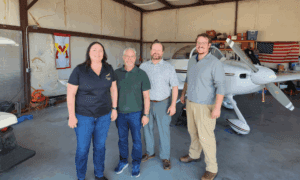Despite not allowing any public comment on the controversial big box request from Capital City Development at last week’s council meeting, new Peachtree City Mayor Don Haddix insists he will not be doing the same terribly often.
On controversial issues, Haddix expects the city council to hold special separate workshop or “town hall” meetings. And he will urge residents who have concerns about such issues to attend those special meetings that will be focused on those matters.
While Haddix agreed that city staff’s recommendation on certain issues is not available for workshop meetings, he argued that is an even better reason for citizens to attend workshops because their opinion has the potential to help shape staff’s recommendations.
“I will be opening up the floor for non-public hearing items,” Haddix said. The city is required to open up the floor for comments during public hearings when they are required by law.
Though public comment on hot-button issues will continue to be taken at council meetings even if there is no “public hearing,” Haddix said he will reserve the right to restrict or limit public comment on non-controversial topics.
“The citizens can get their most productive and open format possible with the workshop because it’s a loose structure,” Haddix said.
Haddix admitted that on several previous occasions, input from the public at public hearings during council meetings have caused him to change his opinion on a given issue, or raised enough questions to warrant the matter being tabled so further research may be conducted before a vote.
The city is having a special workshop on how to handle cellphone tower requests on Tuesday, Feb. 2, and Haddix said he expects there to be a good amount of citizens. When the issue was discussed in December, several residents complained about the possibility of the city locating cell towers on city-owned park land in residential areas.
When it came to CCD’s request last week for a 50,000 square foot store to be upsized to 65,000 square feet, Haddix said opening the floor up for public comment wasn’t necessary because of all the input council has received over the past two years on the topic. And while the three new council members may not have had the benefit of those 6,000-plus emails in that time frame from residents, each new council members has conducted their own research on the issue and also got input from citizens while campaigning for office, Haddix noted.
“We just beat it to death,” Haddix said.
The new council members, each of whom campaigned to further restrict big box (regional) retail stores in the city, are also thinking time is on their side with the CCD proposal. Although CCD currently has the right to purchase most of Line Creek Drive and Line Creek Circle, that right expires within five years if CCD fails to get an approved site plan from the city.
Without those streets, CCD would be unable to develop any large regional stores because of city regulations for road setbacks, officials have said.
CCD is authorized to build up to three stores each with a maximum size of 50,000 square feet. The total development is limited to no more than 175,000 square feet total on the 14-acre site.
The proposed shopping center is located at the southwest intersection of Planterra Way and Ga. Highway 54 West. The development has been of come controversy because of the road abandonment “enabling” big box development and also because the city council agreed last year to petition the Georgia Department of Transportation for a traffic light to serve the proposed shopping center.
DOT previously turned down such a light twice when it was requested by CCD, citing the proximity of the intersection to the existing traffic lights on Planterra Way and also on MacDuff Parkway. But after the city petitioned for the light (which was approved on a 3-2 vote with Haddix and councilman Doug Sturbaum against), the DOT ultimately approved the light.
The CCD site buts up against the Cardiff Park subdivision at the rear of its property, and residents there fought to negotiate significant buffers along the homes and other issues that were addressed by CCD.











Leave a Comment
You must be logged in to post a comment.